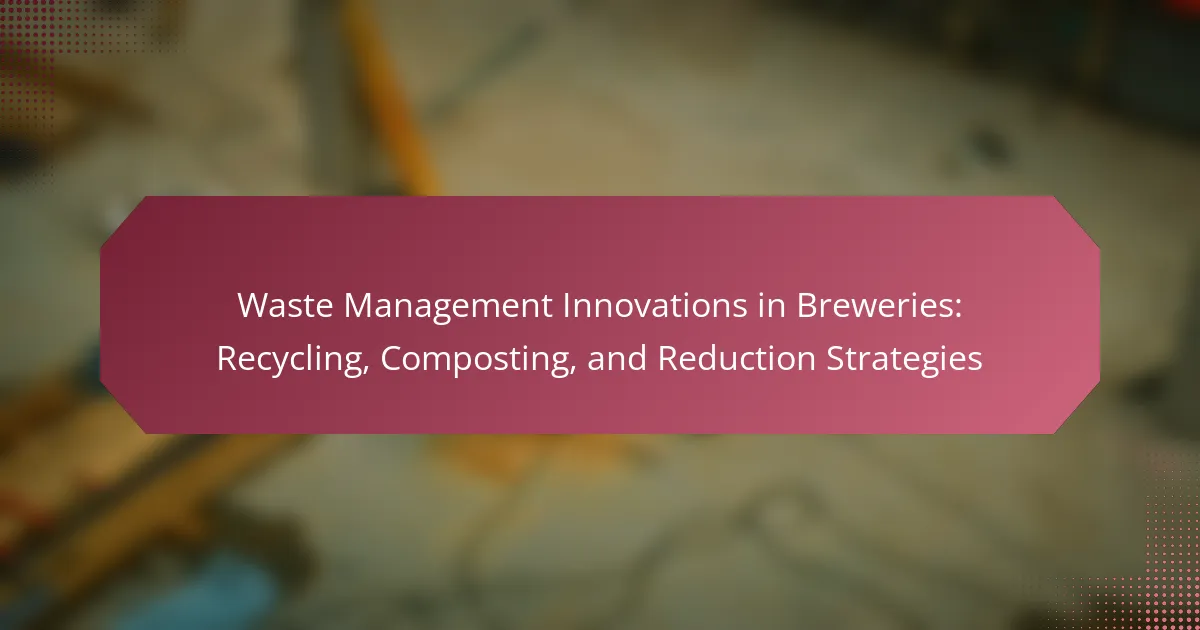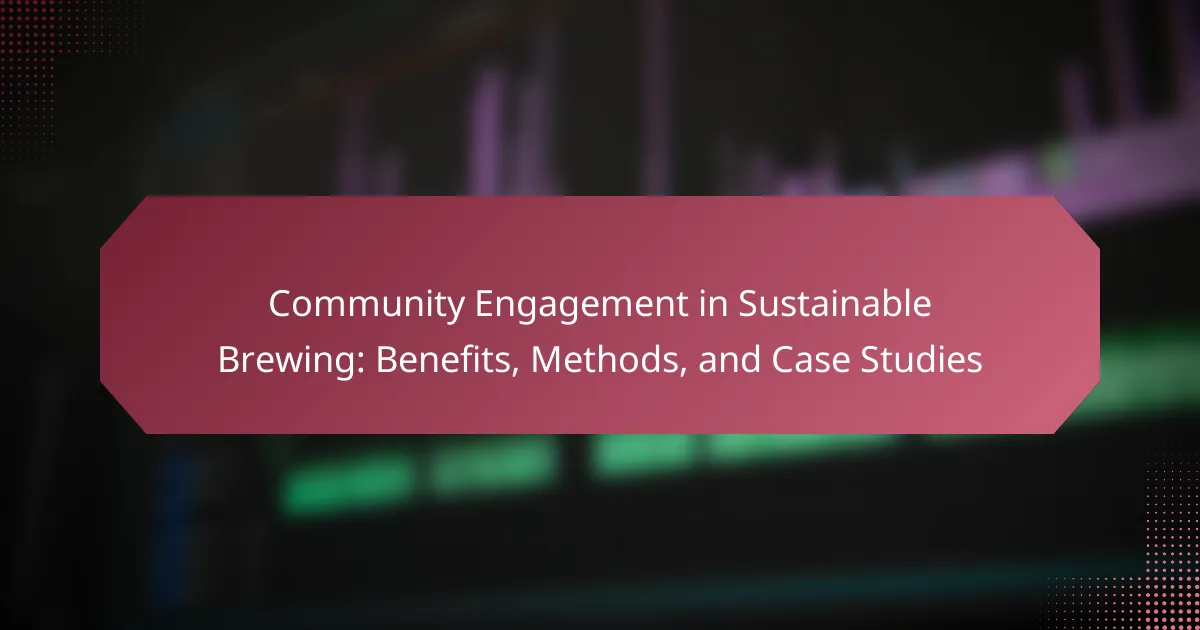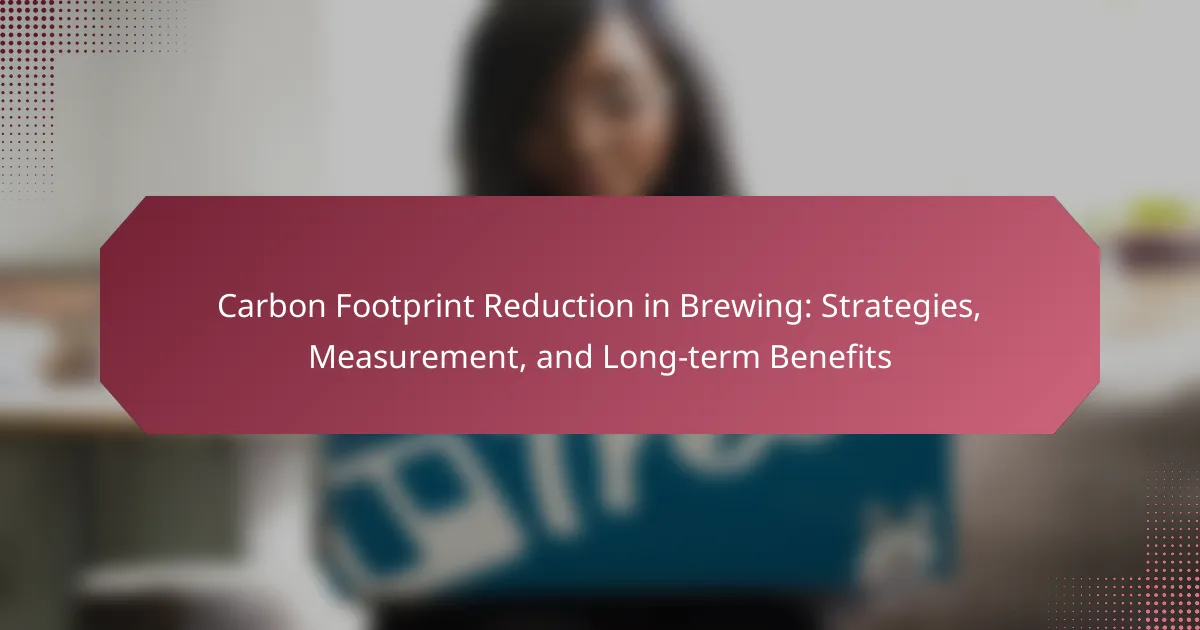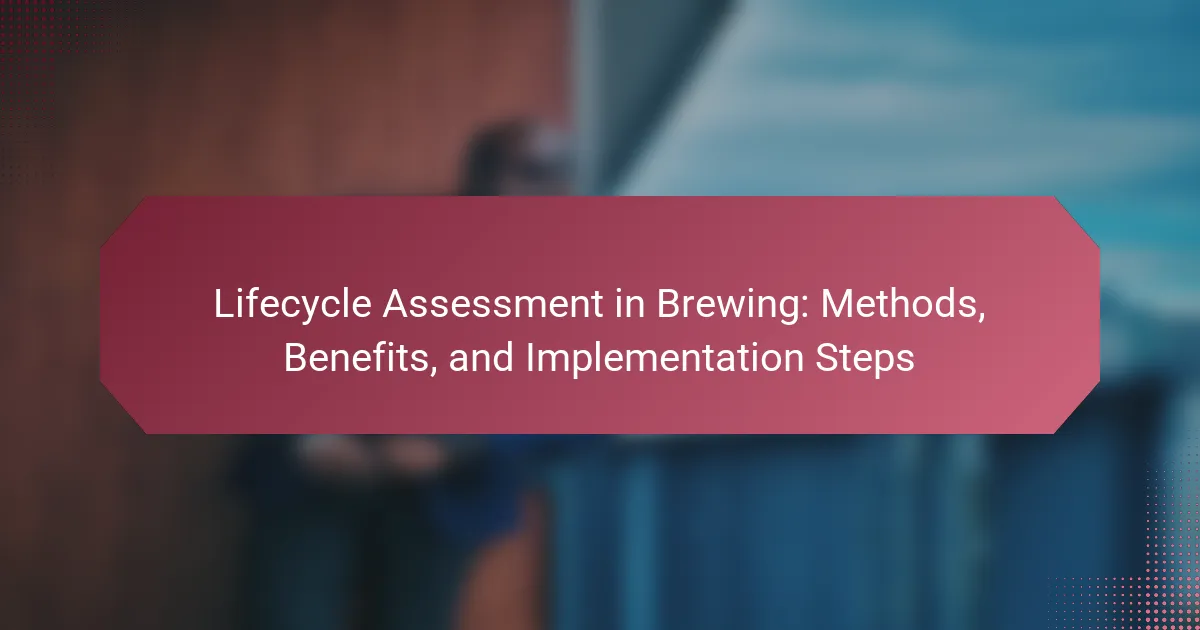Waste management innovations in breweries focus on advanced recycling, composting, and waste reduction techniques. Key strategies include the implementation of closed-loop systems, which allow for the reuse of byproducts such as spent grains, and technologies like anaerobic digestion, which converts organic waste into biogas for energy. Breweries are also adopting water reclamation systems and digital monitoring tools to enhance waste tracking and management efficiency. Successful case studies highlight the effectiveness of these approaches, with some breweries achieving up to a 99.8% diversion rate from landfills. Overall, these innovations not only promote sustainability but also lead to significant reductions in operational costs and waste generation.
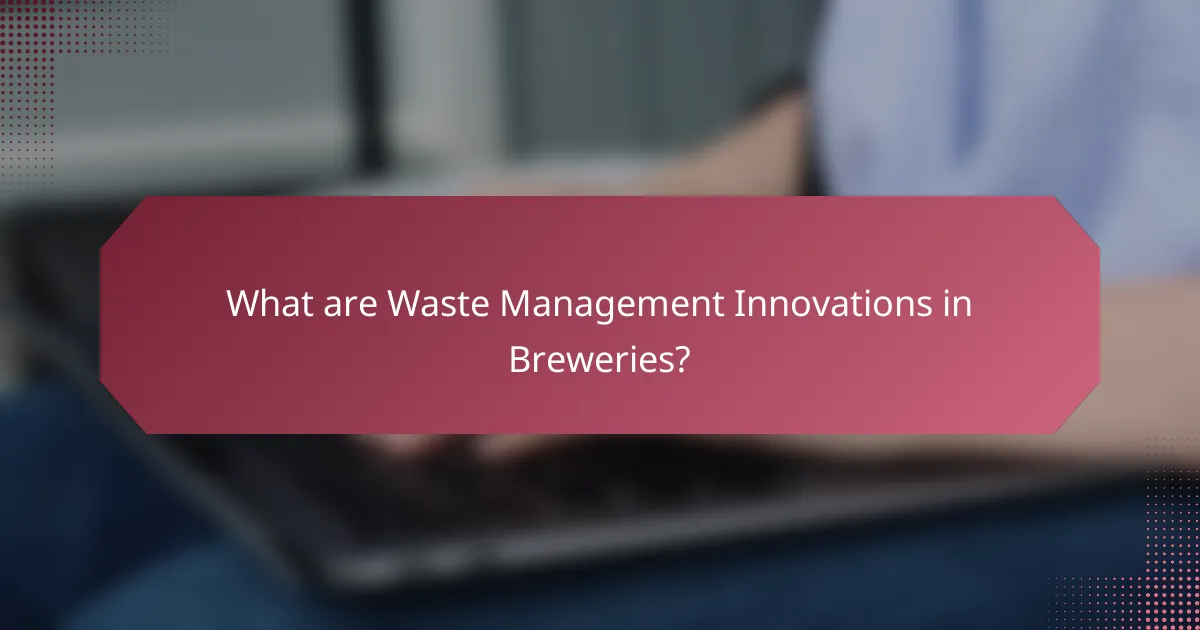
What are Waste Management Innovations in Breweries?
Waste management innovations in breweries include advanced recycling, composting, and waste reduction techniques. Breweries are increasingly adopting closed-loop systems to minimize waste. These systems allow for the reuse of byproducts, such as spent grains, in animal feed or as compost. Technologies like anaerobic digestion convert organic waste into biogas for energy production. Additionally, breweries implement water reclamation systems to reuse process water. The adoption of digital monitoring tools enhances waste tracking and management efficiency. Studies show that these innovations can significantly reduce landfill contributions and lower operational costs. For example, the Brewers Association reports that sustainable practices can lead to a 10-30% reduction in waste generation.
How do breweries implement waste management innovations?
Breweries implement waste management innovations by adopting recycling, composting, and reduction strategies. They recycle materials such as glass, plastic, and metal to minimize landfill waste. Many breweries also compost spent grains and hops, turning them into valuable soil amendments. Additionally, breweries focus on reducing water usage and energy consumption during production processes. For instance, some breweries have installed closed-loop systems that reuse water in their operations. Innovations like anaerobic digestion convert organic waste into biogas, providing renewable energy. According to the Brewers Association, 90% of breweries have implemented some form of sustainability practices, demonstrating widespread commitment to waste management innovations.
What types of waste are commonly produced in breweries?
Breweries commonly produce several types of waste. These include spent grains, which are the solid remnants after the brewing process. Spent hops are another byproduct, consisting of leftover plant material after flavor extraction. Yeast is also discarded after fermentation, contributing to organic waste. Wastewater is generated during cleaning and production processes, containing various organic compounds. Additionally, breweries produce packaging waste from bottles, cans, and labels. Each type of waste presents opportunities for recycling and composting. For example, spent grains can be used as animal feed or composted.
How do waste management innovations address these types of waste?
Waste management innovations in breweries address waste through recycling, composting, and reduction strategies. These innovations focus on minimizing waste generation and enhancing resource recovery. For instance, breweries often implement closed-loop systems to recycle water and reduce wastewater. Additionally, spent grains can be repurposed as animal feed or converted into energy through anaerobic digestion. Composting programs are used to process organic waste, turning it into valuable soil amendments. Innovations like bioreactors and filtration systems improve the efficiency of waste treatment processes. According to the Brewers Association, implementing these strategies can reduce waste by up to 90%. This evidence highlights the effectiveness of waste management innovations in breweries.
What are the key benefits of waste management innovations for breweries?
Waste management innovations for breweries provide significant benefits such as cost savings, environmental sustainability, and improved efficiency. These innovations help reduce operational costs by minimizing waste disposal fees. They also enhance resource recovery, allowing breweries to recycle materials like glass and aluminum. Environmental sustainability is achieved through reduced landfill contributions and lower carbon footprints. Innovations like composting spent grains create valuable byproducts for agricultural use. Improved efficiency in waste processing leads to streamlined operations. According to a study by the Brewers Association, breweries implementing waste reduction strategies can save up to 30% on waste management costs. Overall, these innovations contribute to a more sustainable brewing industry.
How do these innovations impact environmental sustainability?
Innovations in waste management within breweries significantly enhance environmental sustainability. These methods, including recycling, composting, and waste reduction, minimize landfill contributions. For instance, breweries that implement recycling programs can divert up to 90% of their waste from landfills. Composting organic waste reduces methane emissions, a potent greenhouse gas. Additionally, waste reduction strategies lower resource consumption and energy use. Implementing these innovations can lead to a more circular economy in the brewing industry. According to the Brewers Association, sustainable practices can reduce operational costs by up to 30%. Thus, these innovations not only support environmental goals but also provide economic benefits.
What economic advantages do breweries gain from implementing these strategies?
Breweries gain significant economic advantages from implementing waste management strategies. These strategies reduce operational costs by minimizing waste disposal fees. For instance, recycling and composting can lower landfill expenses. Additionally, breweries can generate revenue through selling byproducts, such as spent grains, to farmers for animal feed. This creates a secondary income stream. Implementing these strategies can also enhance brand reputation, attracting environmentally conscious consumers. A strong brand reputation can lead to increased sales. In fact, studies show that sustainable practices can improve customer loyalty and market share. Overall, waste management innovations lead to cost savings and potential revenue growth for breweries.
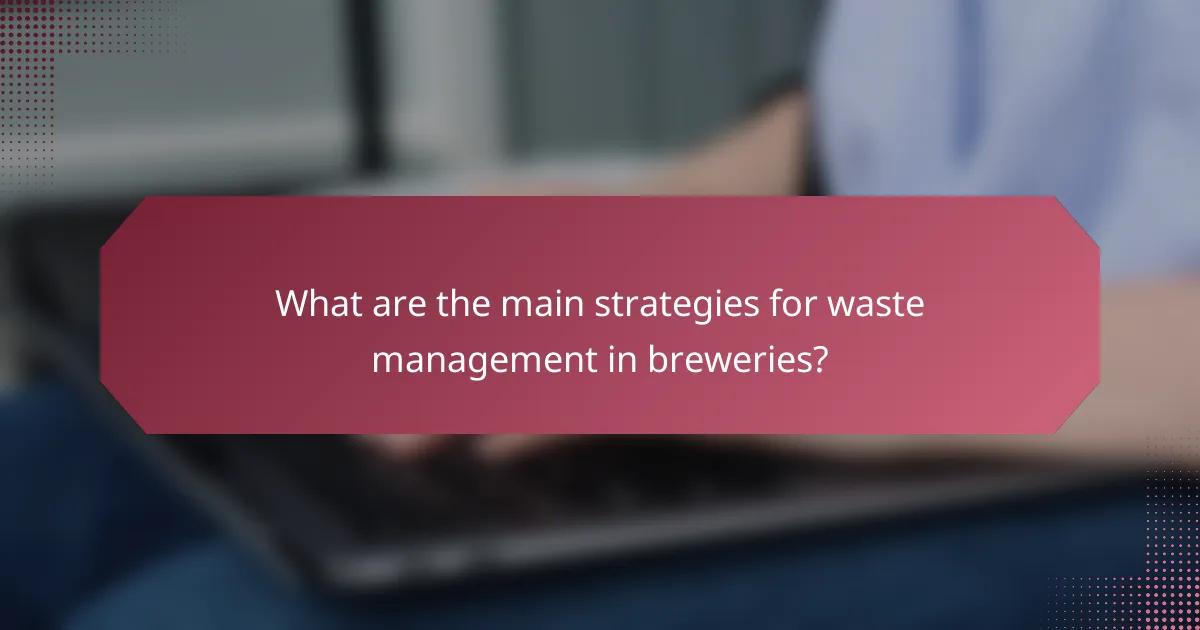
What are the main strategies for waste management in breweries?
The main strategies for waste management in breweries include recycling, composting, and waste reduction. Recycling involves processing materials like glass, aluminum, and cardboard to reduce landfill waste. Composting is used to convert organic waste, such as spent grains and hops, into nutrient-rich soil amendments. Waste reduction focuses on minimizing waste generation by optimizing processes and utilizing technology. For example, breweries can implement closed-loop systems to reuse water and ingredients. These strategies not only enhance sustainability but also improve operational efficiency. According to the Brewers Association, breweries can reduce their waste by up to 90% through effective waste management practices.
How does recycling play a role in brewery waste management?
Recycling is essential in brewery waste management as it reduces landfill waste and promotes sustainability. Breweries generate significant waste, including spent grains, hops, and packaging materials. By recycling these materials, breweries can minimize their environmental impact. For example, spent grains can be repurposed as animal feed or used in bioenergy production. Additionally, glass and aluminum packaging can be recycled, conserving resources and energy. A study by the Brewers Association indicates that recycling initiatives can lead to a reduction of up to 50% in overall waste. This demonstrates the effectiveness of recycling in enhancing brewery waste management practices.
What materials are typically recycled in breweries?
Breweries typically recycle materials such as glass, cardboard, plastic, and metal. Glass bottles are cleaned and reused or crushed for recycling. Cardboard packaging is often collected and sent to recycling facilities. Plastic containers and wrap are also recycled to reduce waste. Additionally, metal cans are recycled, contributing to resource conservation. These practices help breweries minimize their environmental impact. According to the Brewers Association, many breweries strive for zero waste through comprehensive recycling programs.
What processes are involved in recycling brewery waste?
Recycling brewery waste involves several key processes. First, spent grains are separated from the liquid during the brewing process. These grains can be repurposed as animal feed or used in baking. Second, wastewater is treated to remove contaminants. This process often includes biological treatment to break down organic matter. Third, spent hops and yeast can be composted or used in biogas production. This creates energy and reduces landfill waste. Additionally, some breweries implement circular economy practices. This means reusing materials within the brewery or selling by-products to other industries. These processes collectively minimize waste and promote sustainability in the brewing industry.
What is the significance of composting in breweries?
Composting in breweries is significant for waste reduction and sustainability. Breweries generate large amounts of organic waste, primarily from spent grains and hops. Composting transforms this waste into nutrient-rich soil amendments. This process minimizes landfill contributions and reduces greenhouse gas emissions. Additionally, composting can lower disposal costs for breweries. It also supports local agriculture by providing organic materials for soil health. Studies show that breweries implementing composting can achieve a significant reduction in their overall waste footprint.
What types of organic waste can be composted?
Kitchen scraps such as fruit and vegetable peels can be composted. Coffee grounds and filters are also suitable for composting. Eggshells can add calcium to the compost. Yard waste, including grass clippings and leaves, is compostable as well. Small branches and twigs contribute to the compost mix. Additionally, shredded paper and cardboard can be included in compost piles. These materials break down and enrich the soil. Composting these organic wastes reduces landfill contributions and supports sustainable practices.
How does composting benefit brewery operations?
Composting benefits brewery operations by reducing waste and creating valuable soil amendments. Breweries generate significant organic waste, primarily from spent grains and hops. Composting this organic matter diverts it from landfills, minimizing disposal costs. It also reduces greenhouse gas emissions associated with waste decomposition. The compost produced can enhance soil health and fertility for local agriculture. This practice supports sustainable operations and aligns with environmental regulations. Studies show that breweries implementing composting can significantly lower their overall waste footprint.
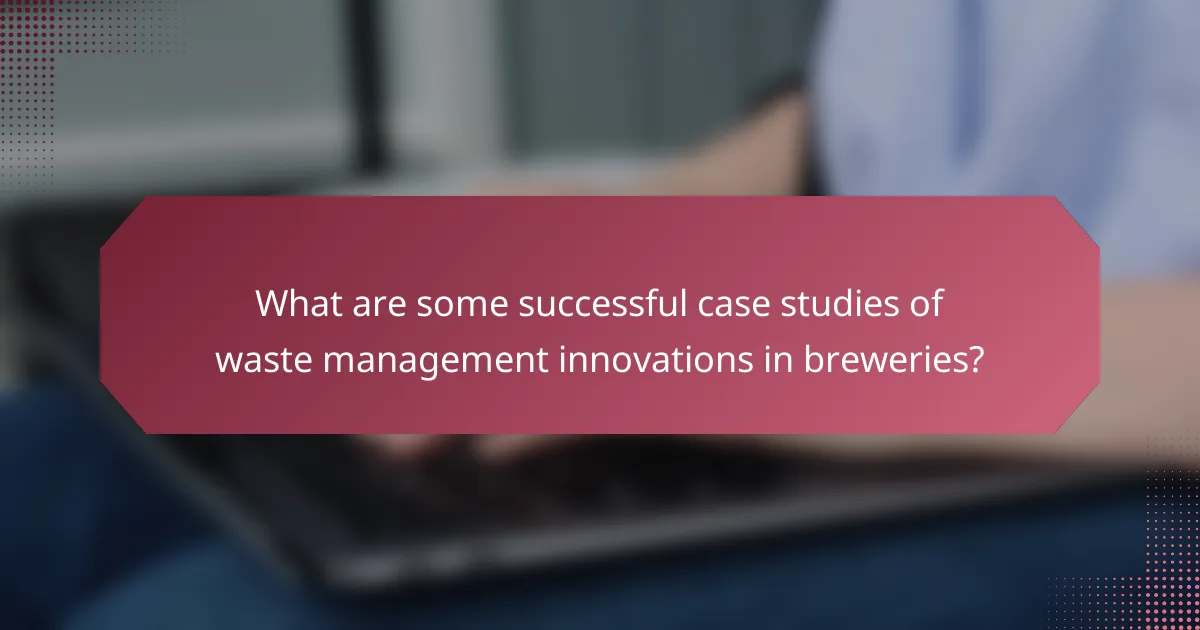
What are some successful case studies of waste management innovations in breweries?
Successful case studies of waste management innovations in breweries include the use of spent grain as animal feed. For example, New Belgium Brewing Company repurposes 100% of its spent grain, reducing landfill waste significantly. Another case is Sierra Nevada Brewing Co., which utilizes a zero-waste program. This program achieved a 99.8% diversion rate from landfills. Additionally, the Dogfish Head Craft Brewery converts wastewater into biogas, which powers their facility. These innovations demonstrate effective waste management strategies in the brewing industry.
What breweries are leading the way in waste management innovations?
Sierra Nevada Brewing Co. is a leader in waste management innovations. They have implemented a zero-waste program that diverts over 99% of their waste from landfills. New Belgium Brewing Company also excels in this area, using a combination of composting and recycling to minimize waste. They achieved a 100% diversion rate from landfills in 2019. Dogfish Head Craft Brewery has adopted innovative practices, including repurposing spent grains for animal feed. Additionally, Brooklyn Brewery focuses on energy efficiency and waste reduction in their operations. These breweries exemplify best practices in sustainable waste management within the brewing industry.
What specific strategies have they implemented?
Breweries have implemented various waste management strategies to minimize their environmental impact. These include recycling initiatives for glass, aluminum, and cardboard. Composting organic waste from brewing processes is also a common practice. Breweries often reduce water usage through advanced filtration systems. They may also employ energy recovery systems to utilize waste heat. Additionally, some breweries partner with local farms to repurpose spent grains as animal feed. These strategies not only enhance sustainability but also lower operational costs. The effectiveness of these strategies is supported by case studies showing reduced waste output and increased resource efficiency.
What results have they achieved from these innovations?
Breweries have achieved significant reductions in waste through innovations in recycling, composting, and reduction strategies. For instance, many breweries report diverting over 90% of their waste from landfills. This is accomplished by implementing comprehensive recycling programs for materials like glass and cardboard. Composting organic waste, such as spent grains, has also become a common practice. Some breweries convert spent grains into animal feed or energy, further minimizing waste. Additionally, these innovations often lead to cost savings in waste disposal fees. Many breweries have also enhanced their sustainability profiles, attracting eco-conscious consumers. Overall, these strategies contribute to a more sustainable brewing process and a positive environmental impact.
How can other breweries adopt these waste management strategies?
Other breweries can adopt waste management strategies by implementing recycling programs, composting organic waste, and reducing overall waste generation. They should start by assessing their current waste output. This assessment helps identify key areas for improvement. Breweries can then establish partnerships with local recycling facilities. This ensures that recyclable materials are processed correctly.
Composting can be integrated by using spent grains and other organic waste. This not only reduces landfill waste but also provides valuable compost for local farms. Additionally, breweries can invest in waste reduction technologies. These technologies can streamline production processes and minimize waste.
Training staff on waste management practices is crucial for successful implementation. Engaging employees fosters a culture of sustainability. Finally, breweries can share their successes and challenges with the industry. This collaboration can lead to more effective strategies and innovations.
What steps should breweries take to start implementing these strategies?
Breweries should begin implementing waste management strategies by conducting a waste audit. This audit identifies the types and volumes of waste produced. Next, breweries should set specific waste reduction goals based on audit findings. They can then explore recycling options for materials like bottles and cardboard. Establishing a composting program for organic waste is also crucial. Training staff on new waste management practices enhances participation and effectiveness. Collaborating with local recycling and composting facilities can optimize processes. Finally, monitoring progress regularly ensures goals are being met and allows for adjustments.
What common challenges might breweries face in this process?
Breweries commonly face challenges in waste management processes. These include high operational costs associated with recycling and composting. Limited space for waste storage can complicate waste management efforts. Regulations regarding waste disposal can be complex and vary by location. Additionally, breweries often struggle with finding reliable recycling partners. Educating staff about proper waste segregation is another hurdle. Lastly, inconsistent waste generation rates can disrupt planned waste management strategies.
What best practices can breweries follow for effective waste management?
Breweries can adopt several best practices for effective waste management. Implementing a recycling program is essential. This includes separating glass, plastic, and cardboard waste. Composting organic waste, such as spent grains, reduces landfill contributions. Breweries can partner with local farms to utilize spent grains as animal feed. Additionally, reducing water usage minimizes wastewater production. Monitoring waste output helps identify areas for improvement. Training staff on waste management practices enhances compliance. Lastly, conducting regular audits of waste management systems ensures accountability and effectiveness.
Waste management innovations in breweries focus on recycling, composting, and waste reduction strategies to enhance sustainability and operational efficiency. Key practices include the implementation of closed-loop systems, anaerobic digestion for energy production, and water reclamation processes. These innovations help breweries significantly reduce landfill contributions and operational costs, with studies indicating potential waste reductions of up to 90%. The article will explore common types of waste produced in breweries, the economic advantages of sustainable practices, and successful case studies from leading breweries in the industry. Additionally, it will address challenges and best practices for effective waste management implementation.
